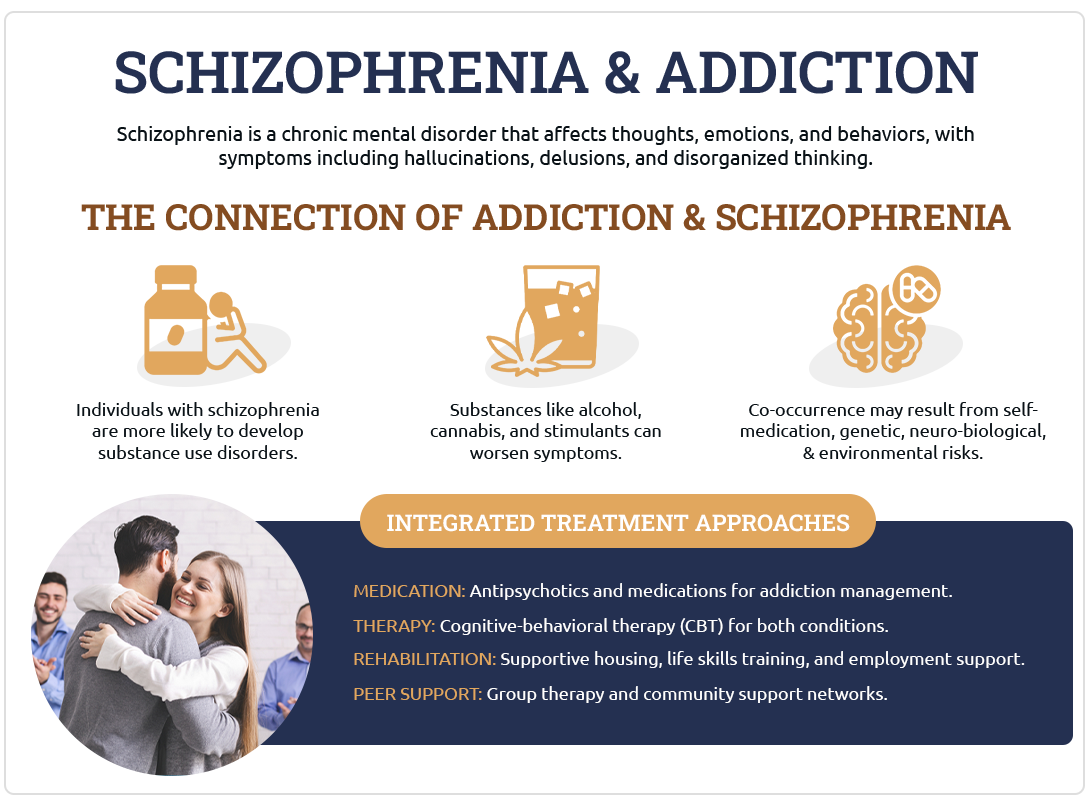The inability to get in touch with reality and connect with other people often causes people with schizophrenia to experience loneliness and depression. To cope with these negative feelings, many people with schizophrenia start to abuse substances.
Constantly abusing substances while suffering from schizophrenia causes people with schizophrenia to develop the co-occurring disorders of schizophrenia and drug addiction.
Unfortunately, suffering from an addiction to substances while having schizophrenia will only increase the severity of your schizophrenia symptoms. That’s why it’s important to understand how to manage your schizophrenia symptoms.
Cognitive behavioral therapy (CBT) for schizophrenia can help individuals better manage their negative feelings and symptoms by teaching them how to replace their negative thoughts and feelings with positive and productive thoughts and feelings.
Before learning how to manage your schizophrenia symptoms, though, you must first learn what the symptoms of schizophrenia are. You must also understand what the causes and risk factors of schizophrenia are. Once you do all of that, you’re one step closer to treating schizophrenia and drug use.
Those who suffer from schizophrenia also struggle to make rational decisions and process thoughts in an organized way. Constantly having hallucinations and delusions can even cause people with schizophrenia to hear voices or develop an extreme level of paranoia. This often causes individuals to think that people are out to get them or that other people are controlling their minds and thoughts.
People who suffer from schizophrenia are often harmless. Still, their extreme paranoia and weird behaviors often cause other people to become frightened of them. This fear then causes many people to ostracize or bully those with schizophrenia.


The Unfortunate Connection Between Schizophrenia and Suicide
Signs of schizophrenia sometimes appear in childhood. Still, most people don’t fully develop schizophrenia until their late teens or early twenties. Once people develop this disorder, more than 10% of those people will commit suicide within the first 10 years of suffering from it.
Those with schizophrenia who don’t commit suicide must learn how to manage their schizophrenia symptoms throughout the rest of their lives. This is because there is no real cure for schizophrenia.
Managing schizophrenia for an entire adult life may seem difficult and overwhelming. However, with the help of an accredited dual diagnosis program for schizophrenia and drug use, it’s something that all people with schizophrenia can learn to manage.
What Are the Signs of Schizophrenia?
Although these are common signs of schizophrenia, they can also be signs of other mental illnesses. Therefore, make sure that you receive a schizophrenia diagnosis prior to going through dual diagnosis treatment for schizophrenia and drug addiction.
Symptoms of Schizophrenia
- Hallucinations
- Delusions
- Disorganized thinking and speaking
- Disorganized and abnormal motor behavior
- Other miscellaneous symptoms
The symptoms of schizophrenia are a tough burden to bear. For those suffering from them, it’s a very real struggle (though it may not seem like it to the average individual). If you are close to someone with schizophrenia, understanding their pain is imperative to their overall growth and well-being. This doesn’t mean you have to encourage their behavior, but it would go a long way to at the very least validate their struggles. Below is some more information on the symptoms of schizophrenia.
Hallucinations are what people with schizophrenia experience when they see or hear things or people that don’t exist. Most people who experience hallucinations primarily hear things that are not real. Through therapy for schizophrenia and drug use, a therapist can teach those suffering how to deal with the voices in their heads.
Delusions are false beliefs with no basis in reality. They are very common among those with schizophrenia. An example of a delusion is when a person believes that another person is his or her significant other despite never meeting that person. Treatment for schizophrenia can help people with schizophrenia manage their delusions. This is by showing them how to test the reality of their thoughts and perceptions.
When a schizophrenic individual suffers from disorganized thinking and speaking, he or she will speak in abnormal ways. This is often due to those with schizophrenia stringing random words together in their minds. As a result, schizophrenic people often struggle to communicate with others.
People who suffer from schizophrenia tend to excessively fidget and move their bodies. The movements of some individuals are so abnormal that they cause schizophrenics to exhibit a weird or inappropriate posture.
There are many other random symptoms of schizophrenia that contribute to those suffering from schizophrenia not being able to function in society. One of these miscellaneous schizophrenia symptoms is the inability to make eye contact. This inability can be due to those with schizophrenia not being used to socializing with others. The fact that schizophrenia is often characterized by a struggle to express emotion also doesn’t help.
Another miscellaneous negative symptom of schizophrenia is a lack of personal hygiene. This is possibly due to the fact that people with schizophrenia are too busy living in their own world. Dealing with paranoia can make it difficult to concentrate on normal societal expectations, such as keeping up with their personal hygiene.
The fact that many people who suffer from schizophrenia also suffer from depression can also be a reason why people with schizophrenia don’t feel that it’s worth it to maintain their personal hygiene.
Causes of Schizophrenia
Like most mental illnesses, schizophrenia is likely hereditary in some way. Therefore, if schizophrenia runs in your family, you may have a genetic predisposition to the disorder.
For some people, the genetic predisposition to schizophrenia is so strong that they develop it without any outside triggers by the time they reach adulthood. For others, the trigger of stress combined with a predisposition to schizophrenia can lead to the development of the illness.
An imbalance or low level of neurotransmitters in the brain is one of the risk factors for schizophrenia. This is because it can cause your mind and body to not function properly. Having an imbalance or low level of neurotransmitters in your brain can also cause one to experience emotional highs or lows, which can then trigger mental illnesses such as depression or schizophrenia within someone.
Even structural changes to the brain can cause mental illnesses like schizophrenia to pop up. This is because structural changes in the brain lead to chemical changes in the brain.
Pregnancy or birth complications increase the chances that a newborn child will suffer from schizophrenia. The opposite is also true: Suffering from schizophrenia will increase the chances that you will suffer from complications during pregnancy.
Childhood trauma is a risk factor for schizophrenia because it can cause people to repress their childhood feelings in a way that can make them come out in the form of hallucinations.
Drug use is a risk factor for schizophrenia in people that already have a predisposition to it. This is particularly the case for substances such as cocaine, LSD, and amphetamines. Many of the substances that can trigger schizophrenia are also highly addictive. As a result, people who abuse drugs can not only trigger schizophrenia but can also trigger the co-occurring disorder of schizophrenia and drug addiction.
Schizophrenia and Drug Addiction
Treatment for Schizophrenia and Drug Use
One popular form of therapy that helps is cognitive behavioral therapy (CBT) for schizophrenia. Cognitive behavioral therapy teaches people to change their negative thoughts, feelings, and emotions into positive ones. Therefore, CBT for schizophrenia will help schizophrenics change their negative and unrealistic beliefs and thoughts into positive and productive beliefs and thoughts that are based on reality.
Other Treatment Options for Schizophrenia and Drug Use
There are more options for treating schizophrenia and addiction than just therapy. Some other treatment options for schizophrenia and drug use include the following:
- Inpatient treatment
- Outpatient treatment
Seeking treatment for schizophrenia and addiction is imperative to overall improvement for those suffering from this particular dual diagnosis. These treatment options could mean the difference between functioning well and not functioning as a human being at all. In some more severe cases, it could also mean the difference between life and death. Addiction and other mental health disorders are very difficult to deal with and require the utmost care and treatment.
Inpatient residential treatment for schizophrenia and addiction is when a person stays in a treatment facility overnight overseen by medical professionals. This method of care lasts anywhere from 28 days to six months. Those who participate attend therapy from 10-12 hours a week. In some cases, therapy is required daily as part of a person’s rehab. Inpatient treatment is mostly used for those who suffer from severe forms of substance use disorder.
In addition to all of this, those participating in an inpatient rehab program also receive room and board. At Northern Illinois Recovery, we aim to provide patients with the utmost in professional care. We do this because we believe people come from different walks of life and require treatment that meets their needs as an individual first.
Outpatient treatment is a method of care in which those who participate either fit into one or two camps. Either they suffer from milder forms of addiction or need a stepping stone between the treatment facility and the world outside rehab
Whichever way you slice it, outpatient treatment is a successful form of rehab in the case of multitudes of people. This method of care typically lasts anywhere from 3 months to over a year. Those who participate in outpatient treatment for schizophrenia and addiction are able to fulfill their daily responsibilities while receiving treatment. This allows those transitioning from inpatient rehab to acclimate to the world outside the facility.
When a person participates in outpatient treatment, they receive anywhere between 10-12 hours of weekly therapy for their mental health disorder. This provides them with plenty more time to live their lives and adjust as necessary. Typically, when a person finishes outpatient rehab, they still have the option of participating in other forms of after-care.
Receive Treatment for Schizophrenia and Drug Use at Northern Illinois Recovery Center
To learn more about Northern Illinois Recovery and the addiction treatment services that we provide, contact us today. We look forward to getting your call.




